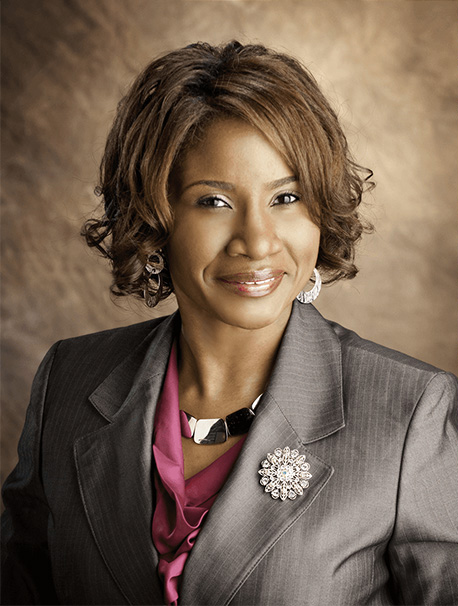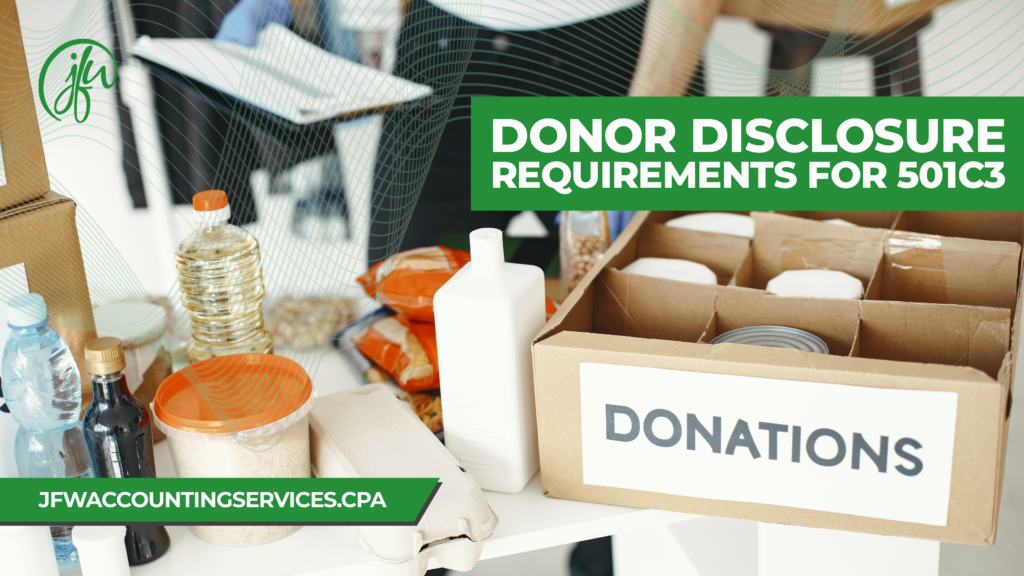Nonprofits earn income from a number of sources so that the revenue can be used to fund the organization’s mission. A significant portion of a charitable organization’s income is collected through contributions. Properly classifying and recording contributions requires a closer look at the current regulations. In this blog, we will discuss the 501c3 donor disclosure requirements.
Identifying Contributions
Revenue collected by a nonprofit can be categorized as either a nonreciprocal or a reciprocal transaction. Nonreciprocal transactions are commonly known as contributions and include donations received by nonprofits. By definition, a contribution is a gift received with no expectation of reward or benefit expected in return. Contributions are treated differently for accounting purposes than reciprocal transactions, or exchanges, where each party receives something of value.
The reporting method used to record contributions and exchanges can be determined by examining the origin of the revenue. Some general indications of revenue that should be considered a contribution include:
- The funder specifies that the donation, contribution, grant, or sponsorship, is intended to support one or more programs of the nonprofit.
- The grant proposal or fundraising appeal specifies that the nonprofit’s intention is to use the funds as a contribution.
- The funder of the contribution does not receive anything of value in exchange.
- The nonprofit organization retains control of the activity inspiring the contribution.
- There are no attached penalties if the nonprofit does not meet performance standards set by the revenue.
Many nonprofit organization leaders confuse grants with contributions. Grants received from a government agency are not contributions, but instead, regarded as exchange transactions for accounting purposes. Grants received from donors or private organizations can be considered contributions. To confirm if revenue should be considered a contribution or an exchange, consider using a flowchart like the one provided at Blue Avocado.
Guidance about identifying contributions and exchanges can be found in the Accounting Standards Codification (ASC) 958-605-55. Information on recording contributions is given in the Accounting Standards Update (ASU) 2018-08, Clarifying the Scope and Accounting Guidance for Contributions Received and Contributions Made.
Accounting for Contributions
ASU 2018-08 goes beyond classifying revenue as a contribution or exchange to provide guidance on the accounting required for the transaction. Once a donation or other revenue is categorized as a contribution, the nonprofit must note if there are any donor restrictions and if the contribution is conditional. Unconditional contributions, including promises to give, are treated as cash basis transactions and recorded as revenue at fair value in the period they are received.
Conditional Contributions
Conditional contributions are ones where the organization must meet certain requirements to receive revenue. A conditional contribution may be performance-based, granted only when the nonprofit meets milestones set by the donor. Conditional contributions may also determine whether the nonprofit gets to keep the contribution, like when a right of return is written into the agreement.
The ASU 2018-08 states that for a contribution to be conditional it must contain both of the following:
- A measurable performance-related barrier that must be overcome by the nonprofit.
- The presence of a “right of return” or “right of release of a promisor’s obligation” if the nonprofit does not overcome conditional barriers.
Conditional contributions are not recorded in an organization’s financial reports until all applicable conditions have been met. One example of a conditional contribution with no donor restriction includes contributions that are set up as “matching donations” where the donor contributes equally to the value of other raised funds. Conditional contributions may also include challenge grants.
Restricted Contributions
Restricted contributions are those in which the gift must be used by the nonprofit for a specific activity or within a specific period. Restricted, unconditional contributions include project grants because they are funds donated for a particular purpose. Conditional contributions can also be restricted like government cost-reimbursement contracts.
Contributions that are both conditional and restricted require careful consideration when recording transactions. The FASB states that once the conditional barriers are overcome, nonprofits can either record the contribution as conditional directly to “net assets without donor restrictions.” This process eliminates the extra task of first recognizing the contribution in the restricted class.
Impact to Nonprofits
The new regulations given by ASU 2018-08 may require nonprofit organizations to make changes to day-to-day operations. Some organizations may find the classifications of contributions to be more accurately recorded if new general ledger (GL) accounts or subaccounts are added allowing for one-time exchange transactions to be recognized separately from transactions that occur over time, like with subscription dues. Sponsorships, membership dues, and proceeds from special events will be presented more clearly if they are bifurcated in the GL.
Bottom Line
The IRS provides guidance for nonprofits regarding the disclosure requirements for charitable contributions. ASU 2018-08 supplemented ASC 958 with further clarification about how to record contributions and distinguish between contributions and exchange transactions. Nonprofit organizations that collect revenue from sponsorships, donations, membership dues, and other contributions may find it necessary to consult with a nonprofit accounting expert, like JFW Accounting Services, to ensure contributions are being recorded correctly.

Jo-Anne Williams Barnes, is a Certified Public Accountant (CPA) and Chartered Global Management Accountant (CGMA) holding a Master’s of Science in Accounting (MSA) and a Master’s in Business Administration (MBA). Additionally, she holds a Bachelor of Science (BS) in Accounting from the University of Baltimore and is a seasoned accounting professional with several years of experience in the field of managing financial records for non-profits, small, medium, and large businesses. Jo-Anne is a certified Sage Intacct Accounting and Implementation Specialist, a certified QuickBooks ProAdvisor, an AICPA Not-for-Profit Certificate II holder, and Standard for Excellence Licensed Consultant. Additionally, Jo-Anne is a member of American Institute of Certified Public Accountant (AICPA), Maryland Association of Certified Public Accountants (MACPA), and Greater Washington Society of Certified Public Accountants (GWSCPA) where she continues to keep abreast on the latest industry trends and changes.

